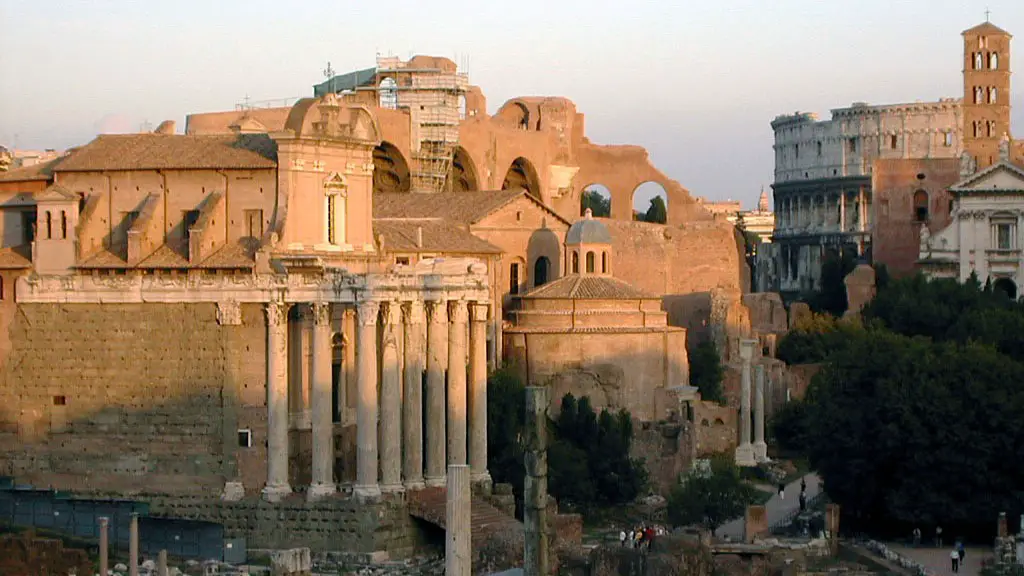Aeneid is a Latin epic poem that was written by Virgil around 30 BC. It is widely considered to be one of the most important works of Latin literature, and its influence on Western culture has been immense. The story is focused around the Trojan hero Aeneas and his escape from Troy after the fall of the city. Aeneas is seen as the ancestor of the Roman people and the founder of the city of Rome. He is portrayed as a refugee, who survives a great deal of tribulations so that he can eventually found the city of Rome. The poem also includes references to the Roman hero’s Julii clan, which was a legendary family that traced its ancestry back to Aeneas.
The Aeneid was an important cultural reference in Ancient Rome, as it was seen as a validation of the Roman people’s cultural heritage. It was also seen as a foundation upon which the heroic values of the Roman people were based. This cultural importance of the Aeneid is why Virgil was so revered by the Roman people, as they saw him as the embodiment of their national heritage. In addition, the poem was used to provide political legitimization to the Julio-Claudian dynasty, which was the ruling family that claimed descent from Aeneas.
Due to its importance in the culture of Ancient Rome, the Aeneid was studied in schools and was a common source of inspiration for many Roman writers and poets. Virgil was admired for his ability to convey strong emotions, as well as for his skillful use of language. He had a tremendous influence on the direction of Latin literature, which is why his works were so widely read in Ancient Rome. Furthermore, the poem also had a significant impact on Western literature as a whole, as it provided the basis for the work of Dante and Milton, among others.
Aside from its cultural importance, the Aeneid also had a great impact on Roman social values. For instance, the poem was used to glorify the Roman Empire, and it depicted the Latins as brave and heroic people who had a boundless devotion to their homeland. Furthermore, the poem also gave a moral lesson to the people of Rome, as it showed the consequences of betraying one’s country and one’s loyalty to the gods. This moral lesson was an especially important one for the citizens of Ancient Rome, as it provided them with a set of guiding principles to live by.
In conclusion, the importance of the Aeneid in Ancient Rome is undeniable. It was regarded as a validation of the Roman people’s cultural heritage, and it provided them with moral lessons to learn. It also had a tremendous influence on the development of Latin literature, as well as Western literature as a whole. As such, it is clear to see why the Aeneid was so important to the people of Ancient Rome, and why it is remembered even today.
Reception and Legacy
The Aeneid was highly appreciated by the Roman people and was revered as a great work of literature. Virgil’s masterpiece was an especially important work for the patrician class, as it focused on values such as loyalty to family and country. As such, it was seen as a defining work for what it meant to be a Roman citizen. Furthermore, the poem was so influential that it was often used by writers, philosophers and politicians as a source of inspiration and guidance. From this, it can be seen how the Aeneid was instrumental in developing the values that were essential for the Roman society.
In addition, the Aeneid was also a foundational part of Western literature. As mentioned earlier, Virgil’s masterpiece provided the basis for the works of Dante and Milton, among others. This influence can be seen even today, as the concepts and themes of the Aeneid are still relevant to modern literature. Furthermore, its impact was not limited to Western literature, as the poem was also highly influential in other cultural contexts, such as Persian and Sanskrit literature.
The legacy of the Aeneid can also be seen in the continued popularity of the poem throughout the centuries. It is still read, studied and admired even today, and the influence that it had on the culture of the Roman Empire can still be felt. Furthermore, the poem is often regarded as one of the greatest works of Latin literature, and its impact on Western culture is still highly evident.
Virgil and His Influence
Virgil was the author of the Aeneid, and his influence on the poem was considerable. Virgil was a poet of the Roman era, and he dedicated the Aeneid to the emperor Augustus, who was the great-grandson of the Trojan hero Aeneas. As such, Virgil’s dedication of the Aeneid to Augustus was considered a great honor for the emperor, as it confirmed his descent from the legendary family of the Julii. Furthermore, Virgil also crafted the Aeneid to be a cultural reference for Ancient Roman society, as he included heroic values and morals, which were essential for a Roman citizen.
Aside from the literary significance of the Aeneid, Virgil was also a highly influential figure in Ancient Rome. He was highly respected by the Roman people, and his opinion was taken seriously by the political leaders of the time. Virgil was also known for his great intelligence and for his skillful use of language. This influence was seen in many works of literature, as Virgil influenced the development of Latin literature and his works served as a major source of inspiration in the ancient world.
Virgil’s influence can still be felt today, as his legacy is still very much alive. His influence on Roman culture and Latin literature is undeniable, and it is clear to see why he was so highly respected by the people of Ancient Rome.
Interpretations of the Aeneid
As one of the most important works of Latin literature, the Aeneid has been subject to various interpretations throughout the centuries. It has been studied by academics and scholars from many different backgrounds, and various interpretations of its themes and messages have been proposed. One of the most common interpretations of the Aeneid is that it was meant to be a positive example for the people of Ancient Rome, as it showed them how to live according to the heroic values that were essential for Roman society.
Furthermore, the poem has also been interpreted as an ambitious attempt by Virgil to establish the Roman Empire as the pre-eminent culture of the Mediterranean world. In such an interpretation, the poem is seen to advocate for Roman imperialism and its cultural superiority over other civilizations. As such, the Aeneid is seen to be a form of propaganda that was used to influence the people of Ancient Rome and to validate the power of the Julio-Claudian dynasty.
Finally, the poem has also been seen as an expression of Virgil’s inner struggles. This interpretation focuses on the personal aspects of the poem and on Virgil’s doubts and fears. In such an interpretation, Virgil’s struggles are seen as reflections of the moral and political struggles of the Roman people. As such, the poem can be seen to be an exploration of the Roman people’s doubts and fears, as well as a representation of their hopes and aspirations.
Conclusion
In conclusion, the Aeneid is one of the most important works of Latin literature, and it has had a tremendous influence on Western culture. It was a cornerstone of Roman culture and was highly appreciated by the Roman people. Furthermore, its influence is still felt in works of modern literature, as it has provided inspiration to many writers and poets. Finally, the poem has been subject to various interpretations over the centuries, and its impact on the culture and morals of Ancient Rome is undeniable.



